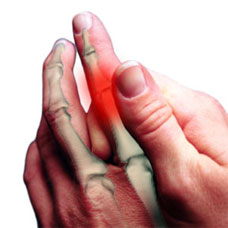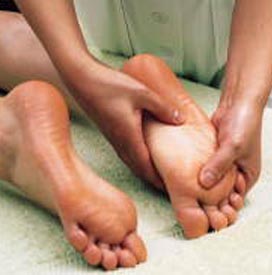|
What is diabetic neuropathy?
Diabetic neuropathies are nerve disorders caused by
diabetes. People with diabetes can, over time, damage their nerves
throughout their body. Neuropathies lead to numbness and sometimes
pain and weakness in the hands, arms, feet, and legs. Problems may
also occur in other organ systems, including the digestive tract,
heart, and sex organs. People with diabetes may develop nerve
problems at any time, but the longer a person has diabetes, the
greater the risk. Diabetic neuropathy appears to be more common in
people who have had problems controlling their blood glucose
levels, in those with high levels of blood fat and blood pressure,
in overweight people, and in people over the age of 40. The most
common type is peripheral neuropathy, which affects nerves of the
arms and legs.
What are the causes?
The causes are different for different varieties of diabetic
neuropathy. Nerve damage is likely due to a combination of
factors:
* metabolic factors, such as high blood glucose, long duration of
diabetes, low levels of insulin, and abnormal blood fat levels
* neurovascular factors, leading to damage to the blood vessels
that carry oxygen and nutrients to the nerves
* autoimmune factors that cause inflammation in nerves
* mechanical injury to nerves, such as carpal tunnel syndrome
* inherited traits that increase susceptibility to nerve disease
* lifestyle factors such as smoking or alcohol use
What are the symptoms?
Symptoms depend on the type of neuropathy and the nerves affected.
Some people have no symptoms at all. For others, numbness,
tingling, or pain in the feet is often the first sign. A person
may experience both pain and numbness. Often, symptoms are minor
at first, and since most nerve damage occurs over several years,
mild cases may go unnoticed for a long time.
Symptoms may include:
* numbness, tingling, or pain in the toes, feet, legs, hands,
arms, and fingers
* wasting of the muscles of the feet or hands
* indigestion, nausea, or vomiting
* diarrhoea or constipation
* dizziness or faintness due to a fall in blood pressure on
standing
* problems with urination
* erectile dysfunction (impotence) or vaginal dryness
* weakness
What are the types of diabetes
neuropathy?
Diabetic neuropathies may be classified as peripheral, autonomic,
proximal, and focal. Each affects different parts of the body in
different ways.
* Peripheral neuropathy causes either pain or loss of feeling in
the toes, feet, legs, hands, and arms.
* Autonomic neuropathy causes changes in digestion, bowel and
bladder function, sexual response, and perspiration. It may also
affect the nerves that serve the heart and control blood pressure.
Autonomic neuropathy may also cause hypoglycaemia (low blood
sugar) unawareness, a condition in which people no longer
experience the warning signs of hypoglycaemia.
* Proximal neuropathy causes pain in the thighs, hips, or buttocks
and leads to weakness in the legs.
* Focal neuropathy results in the sudden weakness of one nerve, or
a group of nerves, causing muscle weakness or pain. Any nerve in
the body may be affected.
How is the diagnosis made?
Neuropathy is diagnosed on the basis of symptoms and a physical
examination. During the examination, the doctor may check the
blood pressure and heart rate, muscle strength, reflexes, and
sensitivity to position, vibration, temperature, or a light touch.
The doctor may also do other tests to help determine the type and
extent of nerve damage.
What is the treatment?
The first step is to bring the blood glucose levels within the
normal range to prevent further nerve damage. Blood glucose
monitoring, meal planning, exercise, and oral drugs or insulin
injections are needed to control blood glucose levels. Although
symptoms may get worse when blood glucose is first brought under
control, over time, maintaining lower blood glucose levels helps
lessen neuropathic symptoms.
Foot care
People with neuropathy need to take special care of their feet.
The nerves to the feet are the longest in the body and are the
ones most often affected by neuropathy. Loss of sensation in the
feet means that sores or injuries may not be noticed and may
become ulcerated or infected. Circulation problems also increase
the risk of foot ulcers.
Here are the steps to follow:
* Clean your feet daily, using warm and not hot water and a mild
soap. Avoid soaking your feet. Dry them with a soft towel; dry
carefully between your toes.
* Inspect your feet and toes every day for cuts, blisters,
redness, swelling, calluses, or other problems.
* Moisturize your feet with lotion, but avoid getting it between
your toes.
* After a bath or shower, file corns and calluses gently with a
pumice stone.
* Each week or when needed, cut your toenails to the shape of your
toes.
* Always wear shoes or slippers to protect your feet from
injuries. Prevent skin irritation by wearing thick, soft, seamless
socks.
* Wear shoes that fit well and allow your toes to move.
* Before putting your shoes on, look them over carefully and feel
the insides with your hand to make sure they have no tears, sharp
edges, or objects in them that might injure your feet.
Pain relief
To relieve pain, burning, tingling, or numbness, the doctor may
suggest aspirin, acetaminophen, or nonsteroidal anti-inflammatory
drugs (NSAIDs). Topical creams and antidepressant medications or
anticonvulsant medications may relieve pain in some people.
Gastrointestinal problems
To relieve mild symptoms of gastroparesis, indigestion, belching,
nausea, or vomiting, doctors suggest eating small, frequent meals,
avoiding fats, and eating less fibre. When symptoms are severe,
the doctor may prescribe medication to speed digestion and help
relieve nausea.
Dizziness and weakness
Sitting or standing slowly may help prevent dizziness or fainting
associated with blood pressure and circulation problems. Some
people may benefit from increased salt in the diet and treatment
with salt-retaining hormones.
Urinary and sexual problems
To clear up a urinary tract infection, the doctor will probably
prescribe an antibiotic. Drinking plenty of fluids will help
prevent another infection. People who have incontinence should try
to urinate at regular intervals (every 3 hours, for example) since
they may not be able to tell when their bladder is full.
To treat erectile dysfunction in men, the doctor will first do
tests to rule out a hormonal cause. Several methods are available
to treat erectile dysfunction caused by neuropathy, including
taking oral drugs, using a mechanical vacuum device, or injecting
a drug called a vasodilator into the penis before sex. The vacuum
and vasodilator raise blood flow to the penis, making it easier to
have and maintain an erection. Another option is to surgically
implant an inflatable or semirigid device in the penis. A
constriction ring or penile sling may be helpful.
Vaginal lubricants may be useful for women when neuropathy causes
vaginal dryness. To treat problems with arousal and orgasm, the
doctor may refer the woman to a gynaecologist.
What is the prevention?
The best way to prevent neuropathy is to keep the blood glucose
levels as close to the normal range as possible. Maintaining safe
blood glucose levels protects nerves throughout the body.
|





